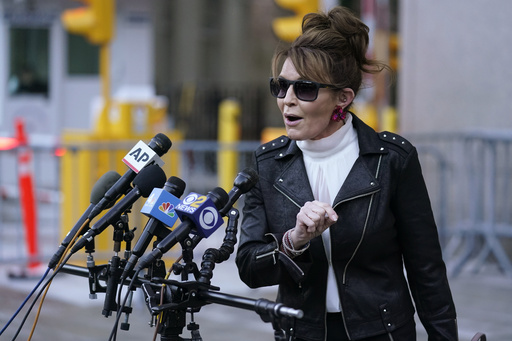
A federal judge has scheduled a retrial for Sarah Palin’s defamation lawsuit against The New York Times for April, while both parties have expressed a desire to explore potential settlement discussions for the first time.
Judge Jed S. Rakoff indicated during a conference call that the trial is set to commence on April 14, unless an agreement is reached beforehand.
The lawsuit originated from a 2017 editorial by the Times, which Palin claims improperly associated her political rhetoric with a mass shooting incident. Although Rakoff dismissed the case in February 2022 while jurors were deliberating, the 2nd U.S. Circuit Court of Appeals reinstated her claim in August.
David L. Axelrod, representing the Times, informed the judge that both sides have initiated discussions regarding how to potentially resolve the lawsuit, especially since it has become increasingly challenging to find witnesses due to the time lapse.
“It may be that we don’t need a trial at all,” Axelrod remarked.
Kenneth G. Turkel, Palin’s attorney, concurred and pointed out that mediation has not previously been attempted. He expressed that both sides are open to trying this approach.
Rakoff appeared favorable toward a settlement, stating, “I’m all for that if you’re seriously interested in settling. You can settle it in a matter of days.” He mentioned that he could arrange for a magistrate judge to assist with the mediation within a day.
Axelrod added that both teams are interested in involving a third party for mediation, while Turkel emphasized that the two sides haven’t yet engaged in any form of discussion.
Palin accused the Times of damaging her reputation and career through the editorial, which the newspaper later admitted contained inaccuracies, describing the errors as an “honest mistake.” The Times also clarified that there was no intention to harm Palin.
After Rakoff had dismissed the case, he allowed the jurors to complete their deliberations, leading to a verdict that was unfavorable to Palin.
The 2nd Circuit’s decision to overturn Rakoff’s dismissal and allow a new trial was based on the conclusion that he had made credibility assessments, evaluated evidence, and disregarded facts or interpretations that might reasonably support Palin’s allegations.
Furthermore, the appeals court pointed out that Rakoff’s ruling during jury deliberations could have been inadvertently communicated to jurors via cellphone alerts, which could undermine the integrity of their verdict.
